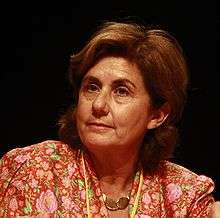Marion Guillou
| Marion Guillou | |
|---|---|
 Marion Guillou in 2008 | |
| Born |
17 September 1954 Marseille, France |
Marion Guillou (born September 17, 1954 in Marseille, France) is a French agronomist specialized in global food security.
Current responsibilities
- Chair of AGREENIUM,[1] the French institute in Agro-Sciences funded by INRA, CIRAD, AgroParisTech, AgroCampus-Ouest, SupAgroMontpellier,and now enlarged to INP Toulouse, BordeauxSciencesAgro and AgroSupDijon
- Board member of the High Level Panel of Experts (HLPE) of the UN Committee on World Food Security of the Food and Agriculture Organization (FAO)
- Board member of Bioversity International
- Board member of BNP Paribas
- Board member of Veolia Environnement
- Board member of Imerys
- Board member of APAVE[2]
- Board member of the Sciences-Po Foundation (FNSP)[3]
- Chair of the arbitration committee of Toulouse IDEX (University of Toulouse)
She recently wrote proposals for the French government on the agro-ecological transition[4][5] (June 2013) and on the organization of the French food safety public services (June 2014).
Biography
Training
She completed her engineering training at École Polytechnique (promotion X1973), and then specialized in water engineering at École nationale du génie rural, des eaux et des forêts (ENGREF, now known as AgroParisTech). She completed a PhD in physico-chemistry of biological processes at Nantes University (UA CNRS).
Food sciences
She worked on food processes and invented a technique to monitor continuously the bio transformations of food products using physical chemistry sensors such as Nuclear Magnetic low resolution Resonance (NMR).
Food safety
She was in charge of the food safety directorate in France from 1996 to 2000. She had to manage the Bovine Spongiform Encephalopathy (BSE) crisis, also known as the mad-cow disease, and to propose the new French food safety organization (1999 law on food safety).
Research management
From 1986 to 1989, she was Regional Delegate for Research and Technology in the Region Pays de la Loire. From 2000 to 2012, she was first CEO, then President and CEO of the French National Institute for Agronomic Research (Institut national de la recherche agronomique) where she prioritized research on agriculture, food and environment. She widened the scope of research topics towards global matters. She put in place interdisciplinary meta-programs, for instance on integrated plant protection and consumer practices.
From 2008 to 2013, she was the chair of the Board of the prestigious École Polytechnique (l'X) and during her mandate, Ecole Polytechnique put a greater emphasis on the scientific and technological training, as well as the innovative management and the cooperation with industry . The creation of a new research center on interfaces between biology and engineering sciences was decided and financed and the organization of the Ecole Polytechnique was reformed.
Global involvement
She founded the Joint Programming Initiative on agriculture and climate change [6] with British colleagues and chaired it during the first three years(2010-2013). This initiative, FACCEJPI, now gathers 21 European countries and links at international level with AGMIP and CCAFS.
Memberships
Academy memberships
- Member of the French Academy of Technology
- Member of the French Academy of Agriculture
- Member of the International Advisory Board of the Chinese Academy of Agricultural Sciences (CAAS)
- Member of the International Food Policy Research Institute (IFPRI) advisory board
Past memberships
- Member of the committee writing the white paper on French foreign policy
- Member of the Attali Committee to find new avenues to foster French economic growth
- Member of the Juppe-Rocard Committee on the Future Investments
- Member of the International Commission on Food Security and Climate Change chaired by Sir John Beddington
Publications
- Grenelle Committee on Research and Innovation (2008)
- The World's Challenge (Quae 2012) (English version) [7] or 9 Milliards d'hommes à nourrir (French version)[8]
- The role for scientists in tackling food insecurity and climate change (BioMed Central, 2011) [9]
- What next after Durban to active a secure food world ? (Science, January 2012-Vol335 no.6066) [10]
- Achieving food security in the face of climate change: Summary for policy makers from the Commission on Sustainable Agriculture and Climate Change [11]
- Report to the French government on the Agro-ecological transition (June 2013)
- Report to the French government on the policy of food safety (June 2014) [12]
References
- ↑ Agreenium - official website
- ↑ Apave - corporate website
- ↑ Sciences-Po Foundation (FNSP)
- ↑ (in French)The agro_ecology project: towards doubly efficient agriculture that reconciles competitiveness with respect for the environment (French version) Archived 2013-10-04 at the Wayback Machine.
- ↑ The agro_ecology project: towards doubly efficient agriculture that reconciles competitiveness with respect for the environment (English version)
- ↑ (in French)FACCEJPI - official website
- ↑ The World's Challenge: Feeding 9 billion people (Quae website)
- ↑ (in French)9 Milliards d'hommes à nourrir (Amazon link)
- ↑ The role for scientists in tackling food insecurity and climate change
- ↑ What next after Durban to active a secure food world ? (Science, Jan 2012)
- ↑ Report on Achieving food security in the face of climate change: Summary for policy makers from the Commission on Sustainable Agriculture and Climate Change Archived 2013-12-27 at the Wayback Machine.
- ↑ (in French)The policy of food safety: diagnosis and proposals Archived 2015-01-11 at the Wayback Machine.